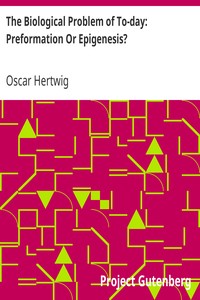The Biological Problem of To-day: Preformation Or Epigenesis? by Oscar Hertwig
"The Biological Problem of To-day: Preformation Or Epigenesis?" by Oscar Hertwig is a scientific treatise written in the late 19th century. This work delves into the biological debate concerning the nature of development, specifically examining two opposing theories: preformation, which posits that all characteristics of an organism are already present in a miniature form within the germ, and epigenesis, which suggests that development is a progressive formation from an initially unorganized state.
Hertwig's exploration of these theories is informed by his expertise in embryology and cell biology. The opening of the book sets up the central question regarding whether embryonic development represents a preformed structure or an elaborative process shaped by environmental influences. Hertwig introduces the ideas of other biologists, particularly focusing on August Weismann's germplasm theory, which classifies hereditary material as distinct and stable while addressing the complexities of reproduction and differentiation. Through critical analysis, Hertwig aims to establish that true development relies on epigenesis, where the organism grows and develops through interactions with its surroundings, rather than merely revealing what was predetermined in the germ. The opening serves as a prelude to a deeper examination of the implications each theory carries for understanding heredity and the intricacies of life. (This is an automatically generated summary.)
Read or download for free
| How to read | Url | Size | |||
|---|---|---|---|---|---|
| Read now! | https://www.gutenberg.org/ebooks/37221.html.images | 309 kB | |||
| EPUB3 (E-readers incl. Send-to-Kindle) | https://www.gutenberg.org/ebooks/37221.epub3.images | 525 kB | |||
| EPUB (older E-readers) | https://www.gutenberg.org/ebooks/37221.epub.images | 526 kB | |||
| EPUB (no images, older E-readers) | https://www.gutenberg.org/ebooks/37221.epub.noimages | 164 kB | |||
| Kindle | https://www.gutenberg.org/ebooks/37221.kf8.images | 778 kB | |||
| older Kindles | https://www.gutenberg.org/ebooks/37221.kindle.images | 749 kB | |||
| Plain Text UTF-8 | https://www.gutenberg.org/ebooks/37221.txt.utf-8 | 267 kB | |||
| Download HTML (zip) | https://www.gutenberg.org/cache/epub/37221/pg37221-h.zip | 515 kB | |||
| There may be more files related to this item. | |||||
Similar Books
About this eBook
| Author | Hertwig, Oscar, 1849-1922 |
|---|---|
| Translator | Mitchell, P. Chalmers (Peter Chalmers), Sir, 1864-1945 |
| Uniform Title | Präformation oder Epigenese? English |
| Title |
The Biological Problem of To-day: Preformation Or Epigenesis? The Basis of a Theory of Organic Development |
| Alternate Title |
The Biological Problem of Today: Preformation Or Epigenesis? The Basis of a Theory of Organic Development |
| Note | Reading ease score: 45.7 (College-level). Difficult to read. |
| Credits |
Produced by Bryan Ness, Josephine Paolucci and the Online Distributed Proofreading Team at http://www.pgdp.net. (This book was produced from scanned images of public domain material from the Google Print project.) |
| Language | English |
| LoC Class | QH: Science: Natural history |
| Subject | Developmental biology |
| Subject | Embryology |
| Subject | Genetics |
| Category | Text |
| EBook-No. | 37221 |
| Release Date | Aug 27, 2011 |
| Copyright Status | Public domain in the USA. |
| Downloads | 122 downloads in the last 30 days. |
| Project Gutenberg eBooks are always free! | |

